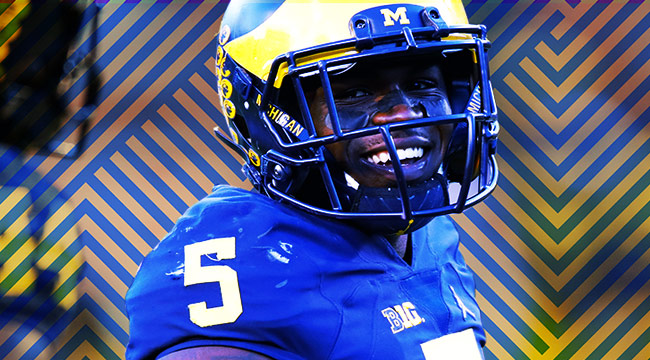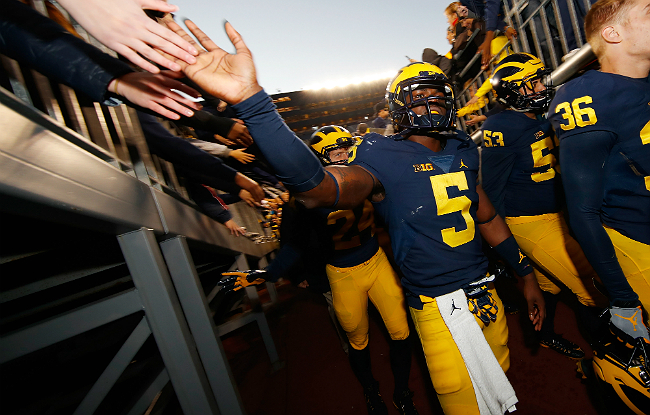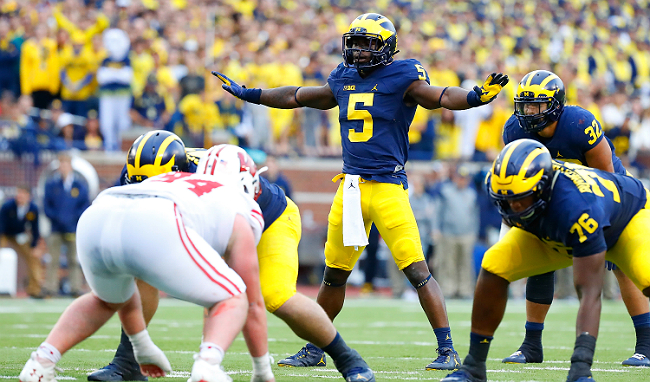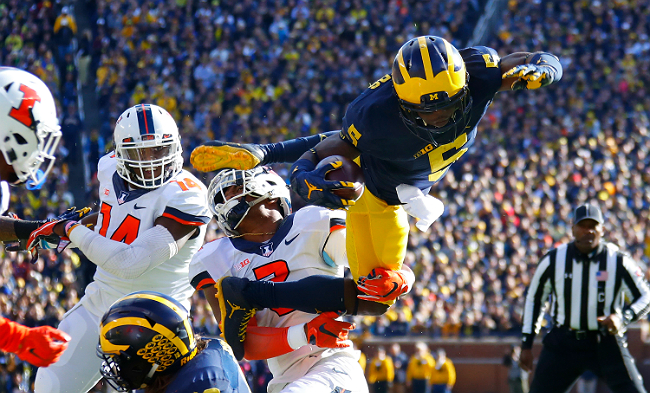
Michigan star Jabrill Peppers is the most well-rounded player in college football, a blue-chip athlete who’s equally comfortable returning kicks, timing up blitzes, running stride for stride with slot receivers, and operating out of the Wildcat. That much has never been in doubt. But is he a serious candidate to win the Heisman Trophy?
Based on everything we know about Heisman politics, the answer should be no: In every year since the turn of the century the trophy has gone to a full-time quarterback or running back, and the further Charles Woodson’s 1997 victory recedes into history, the less likely it seems that another primarily defensive player will ever pull it off again. Two-thirds of the way through the regular season, though, Peppers’ name has become a mainstay on the short list of viable contenders, and this week oddsmakers put his chances of winning nearly on par with some of the nation’s most recognizable quarterbacks. For the time being, at least, no running back or wide receiver has anywhere near the same odds.
Is the hype for real? Would-be Heisman candidates come and go; it’s entirely possible that within a few weeks the momentum behind Peppers’ campaign will fade as quickly as it arose, vindicating the old assumptions about who counts as a serious candidate and who doesn’t. On the other hand, with Michigan 7-0 and rolling toward a potential playoff bid, there’s no end in sight to the Wolverines’ winning streak or the intrigue surrounding their most dynamic player.
Here are five reasons Peppers will have more staying power than Heisman history suggests.

1. It’s a (Relatively) Wide-Open Field. Not to suggest that the Heisman race at this point is still anyone’s to win — in fact, with each passing week it’s looking more and more like Lamar Jackson’s to lose — but it is fair to say that Jackson’s massive, sustained lead over the rest of the rest of the pack says less about the front runner than it does about the failure of anyone else to emerge. There are a dozen guys or more behind Jackson in realistic position to close the gap, but none who seem especially likely to be the one who’s actually going to do it.
If you had to put money on a late riser, the safe bet remains the preseason favorite, Clemson quarterback Deshaun Watson, whose team beat Jackson’s head-to-head in the game of the year to date and is right on track for its second consecutive playoff bid. This is roughly the point on the schedule that Watson really began to assert himself as a contender in 2015 en route to finishing third in final voting. So far this year, however, he feels more like a default option than a real candidate; if not for last year, he probably wouldn’t be on the radar at all, much less in the center.
That goes for most of the other big returning names, too. Christian McCaffrey has been limited by injuries, diminishing returns statistically, and a team that’s rapidly faded from the national consciousness; ditto Leonard Fournette prior to last week’s explosive return to form against Ole Miss. Baker Mayfield has been productive (to put it mildly), but hasn’t quite recovered from his disappearing act in a costly early loss; ditto Dalvin Cook. The remains of J.T. Barrett’s campaign are still being recovered from beneath a pile of Penn State pass rushers. And the most promising dark horses (Washington QB Jake Browning, San Diego State RB Donnel Pumphrey) haven’t had enough air time to gain traction.
All of which is to say the moment is ripe for the rise of an unorthodox contender like Peppers, or another favorite of mine, Alabama’s Jonathan Allen. It’s the Year of the Outsider, right? A whiff of novelty when conventional candidates are leaving voters cold can count for a lot.

2. He Defines His Position. To the extent that Peppers actually has a position, anyway, which is debatable by most standard definitions. But in his case, again, the blurring of traditional lines is the entire point: More than any other college player, he embodies the game’s spread-era evolution toward “positionless football.”
On paper, Peppers converted from safety to linebacker in the spring. In practice, though, the distinction is meaningless — just like last year, his role on defense boils down to him doing a little bit of everything, Honey Badger style, only a lot better than anyone else. In that sense, he’s the ideal prototype for the hybrid nickel position that has become standard at all levels of the sport but has yet to earn a standard, catchall designation. (In the NFL you have “Money.” In college, “Rover,” “Bandit,” and “Star” are becoming more familiar labels, depending on the team; personally, I prefer “Spacebacker.” At least one mainstream mock draft simply lists Peppers’ position as ”S/LB/Superman.”) It’s easy to get the sense watching Peppers that you’re getting a glimpse of the future.
His dalliances on offense and special teams fit into the same context: As far as his jack-of-all-trades rep is concerned, Peppers’ actual production in those roles matters less than the fact that he looks the part in them at all. The important thing is leaving the impression that, regardless of where he lines up, he’s the most dynamic athlete on the field at any given moment, whether the numbers back him up or not.
3. The Numbers Back Him Up. Not necessarily his individual numbers, although his individual numbers are fine: Peppers leads Michigan in solo tackles (28), tackles for loss (10), and QB hurries (5), and ranks among the national leaders in all categories related to punt returns. He’s already scored three total touchdowns — two on offense, one as a return man — matching Charles Woodson’s total in his Heisman-winning season in 1997, and Michigan fans will be happy to inform you that Peppers should have at least one more to his credit. He’ll easily exceed Woodson’s total for all-purpose yards, probably in this weekend’s trip to Michigan State. He’s already passed Tyrann Mathieu’s all-purpose output in 2011, when Mathieu finished fifth.
It is surprising that Peppers has yet to record an interception in his career, or to force a fumble this season. (Incredibly, he hasn’t been credited with breaking up a pass, either, after racking up 10 PBUs last year as a redshirt freshman. That’s mostly because opposing quarterbacks have given him far fewer opportunities.) But the deficits in his personal stat sheet are more than compensated for by the overwhelming, historic dominance of Michigan’s defense as a whole, which is shaping up as a worthy rival to Alabama’s D as the best in the nation. Among all FBS teams, the Wolverines rank no. 1 in:
• Scoring Defense
• Total Defense
• Pass Defense
• Third Down Defense
• Yards Per Play Allowed
• Yards Per Pass Allowed
• First Downs Allowed
• Plays Allowed ≥ 20 Yards
• Defensive S&P+ (This number is unbelievable.)
… and among the top five in rushing defense, yards per carry allowed, pass efficiency defense, tackles for loss, sacks, etc. Pretty much just name a category. The only thing they don’t do especially well (unlike Bama) is create turnovers, which limits their exposure on highlight packages. But at this rate, those numbers are too absurd to ignore. And as the most visible, productive player on the unit that’s producing them, Peppers won’t be, either.

Which brings us to the most compelling factor in his favor:
4. He’s the Face of a National Contender. It’s true that the Heisman consensus tends to default to the best player (or at least the most high-profile player) on the best team, who of course is usually a quarterback or running back. On occasions when a championship-caliber team is clearly carried by its defense, though — as Michigan clearly is this year — there is precedent for the hive mind crossing the line of scrimmage to elevate the real star of the show. That’s why Peppers is in the conversation, as opposed to certain other dual-threat types with equally compelling numbers, because for defensive players it seems that’s the only context in which the conversation can even exist.
Consider the six primarily defensive players who have finished in the top five in Heisman voting in the past 50 years, all but one of whom played for a team that ended the regular season with a chance to win a national championship. Although Woodson could not have won the trophy in 1997 without his contributions as a receiver and return man, he also could not have won had he not played on a unit that led the nation in total defense en route to a 12-0 record and a no. 1 finish in the AP poll. In 2011, Mathieu was the headliner on an LSU team that ended the regular season ranked first in the polls and second in both yards and points allowed. In 2012, Manti Te’o was the runner-up after Notre Dame’s defense dragged a mediocre-at-best offense to the BCS title game. Going further back, there was Washington’s Steve Emtman, who finished fourth in 1991 (the Huskies went on to win a share of the ’91 national championship), and Pitt’s Hugh Green, whose second-place finish in 1980 matched his team’s finish in the polls.
The only notable exception in that span is Nebraska’s Ndamukong Suh, the fourth-place finisher in 2009 despite playing for a 10-4 team that wasn’t even ranked for most of the season. Even then, though, the Cornhuskers led the nation in scoring defense and memorably came within one second of winning the Big 12. Every so often, an offensive player like Melvin Gordon, Robert Griffin III, or Tim Tebow will put up numbers gaudy enough to transcend a team with no chance of winning a championship; depending on how the playoff race shakes out this year, Lamar Jackson or Baker Mayfield might wind up joining that list. But for defensive players a viable candidacy is always a team effort.
The downside of that reality for Peppers is that there’s such little margin for error; if Michigan’s playoff chances go south, his stock goes with them. On the other hand, if the Wolverines keep winning, then the politics of the award will actually work in his favor.
5. His Biggest Stage(s) Are Still In Front of Him. Peppers doesn’t have a single, standalone moment that captured the nation’s imagination, or that neatly wraps up his talent and impact in a few seconds of endlessly repayable video. But Michigan has only played one above-the-fold game, against Wisconsin, a retro offense that may as well have been specifically to designed ensure Peppers would have a quiet afternoon. His best game of the season, against Colorado, looks even better now that Colorado has unexpectedly climbed into the Top 25, but it didn’t permanently etch itself into anyone’s brain at the time.
He’ll have two more opportunities to move the needle in front of a big, national audience, three if things go well, the first coming on Saturday against Michigan State. The Spartans are a shadow of the team that made the final four last year — they’ve lost five in a row, including flops against Indiana, Northwestern, and Maryland — but they’ve still won seven of the last eight against Michigan and ought to command plenty of attention for a noon kickoff. Then, of course, there’s the regular-season finale at Ohio State, the game that defines every Michigan season, which this year figures to determine the Big Ten title, a playoff spot, and whether or not Peppers (or J.T. Barrett on the other side) has a fighting chance at the sport’s most coveted hunk of bronze. Woodson and Desmond Howard both famously clinched their Heisman campaigns with punt-return touchdowns against the Buckeyes that helped send Michigan to the Rose Bowl. It may be an unfair expectations, but it’s hard to see Peppers following suit unless he pulls off something equally dramatic in a win that clinches the Wolverines’ spot in the Big Ten title game.






